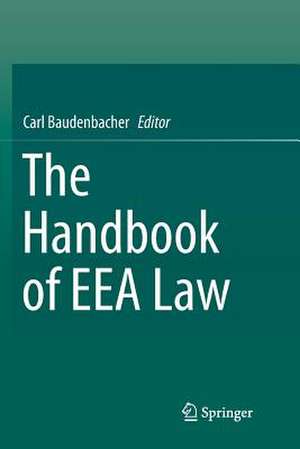The Handbook of EEA Law
Editat de Carl Baudenbacheren Limba Engleză Paperback – 27 mar 2019
The Handbook is first and foremost intended for practitioners and legal scholars, but its approachable style makes it readily accessible for students. The Handbook provides the reader with a thorough grounding in the EEA Agreement, detailing how secondary EU law becomes applicable in the EFTA pillar, and the roles played by the EFTA Surveillance Authority and the EFTA Court. It considers the EEA Agreement from the respective perspectives of the national authorities, courts, and the legal professions of Iceland, Liechtenstein and Norway. The book meticulously examines substantive EEA law, beginning with the general principles and the four freedoms, through competition law and State aid to such aspects as the precautionary principle, tax law and mutual administrative and legal assistance. Emphasis is placed on jurisprudence and especially that of the EFTA Court.
Each chapter has been written by a judge, noted practitioner or eminent academic in their respective fields and the book is divided into twelve parts:
- Part I History and main features of the EEA Agreement
- Part II Genesis of EEA Law
- Part III Institutions and Procedure
- Part IV National Authorities in the EFTA Pillar
- Part V National Courts in the EFTA Pillar
- Part VI The Practicing Bar in the EFTA Pillar
- Part VII General Principles and Prohibition
- Part VIII The Fundamental Freedoms
- Part IX Competition Law and Related Matters
- Part X Further Areas of Economic Law
- Part XI Law of Natural and Economic Resources
- Part XII Social Protection and Public Health
| Toate formatele și edițiile | Preț | Express |
|---|---|---|
| Paperback (1) | 1027.39 lei 6-8 săpt. | |
| Springer International Publishing – 27 mar 2019 | 1027.39 lei 6-8 săpt. | |
| Hardback (1) | 1415.18 lei 6-8 săpt. | |
| Springer International Publishing – 18 dec 2015 | 1415.18 lei 6-8 săpt. |
Preț: 1027.39 lei
Preț vechi: 1252.91 lei
-18% Nou
Puncte Express: 1541
Preț estimativ în valută:
196.64€ • 202.65$ • 166.01£
196.64€ • 202.65$ • 166.01£
Carte tipărită la comandă
Livrare economică 03-17 martie
Preluare comenzi: 021 569.72.76
Specificații
ISBN-13: 9783319796079
ISBN-10: 3319796070
Pagini: 859
Ilustrații: XL, 859 p.
Dimensiuni: 155 x 235 mm
Greutate: 1.23 kg
Ediția:Softcover reprint of the original 1st ed. 2016
Editura: Springer International Publishing
Colecția Springer
Locul publicării:Cham, Switzerland
ISBN-10: 3319796070
Pagini: 859
Ilustrații: XL, 859 p.
Dimensiuni: 155 x 235 mm
Greutate: 1.23 kg
Ediția:Softcover reprint of the original 1st ed. 2016
Editura: Springer International Publishing
Colecția Springer
Locul publicării:Cham, Switzerland
Cuprins
Part I History and main features of the EEA Agreement: The History of the EEA Agreement and the First Twenty Years of Its Existence by Sven Norberg and Martin Johansson.- Part II Genesis of EEA Law: Decision-Making Procedure and Implementation of New Law by Georges Baur.- Suspension of Parts of the EEA Agreement: Disputes about Incorporation, Consequences of Failure to Reach an Agreement and Safeguard Measures by Georges Baur.- The Notion of ‘Opting Out’ by Knut Almestad.- EEA Main Agreement and Secondary EU Law Incorporated into the Annexes and Protocols by Halvard Haukeland Fredrisksen
.- Part III Institutions and Procedure: The EFTA Surveillance Authority by Frank Büchel and Xavier Lewis.- The EFTA Court: Structure and Tasks by Carl Baudenbacher.- The Relationship between the EFTA Court and the Court of Justice of the European Union by Carl Baudenbacher.- Dispute Resolution Under the EEA Agreement by Christa Tobler.- Part IV National Authorities in the EFTA Pillar: Attorney General of Norway byPål Wennerås.- Attorney General of Iceland by Einer Karl Hallvarðsson.- Liechtenstein EEA Coordination Unit by Andrea Entner-Koch and Thomas Bischof.- Part V National Courts in the EFTA Pillar: Norwegian Courts by Thomas Christian Poulsen.- Icelandic Courts by Skúli Magnússon.- Liechtenstein Courts by Wilhelm Ungerank.- Part VI The Practicing Bar in the EFTA Pillar: Norwegian Bar by Thomas Nordby.- Icelandic Bar by Stefán Geir Thórisson.- Liechtenstein Chamber of Lawyers by Mario Frick.- Part VII General Principles and Prohibition: General Principles by Páll Hreinsson.- General Prohibition of Discrimination on Grounds of Nationality by Halvard Haukeland Fredrisksen.- Part VIII The Fundamental Freedoms: Free Movement of Goods by Peter-Christian Müller-Graff.- Right of Establishment and Free Movement of Services by Philipp Speitler.- Free Movement of Persons by Kjartan Bjarni Björgvinsson.- Free Movement of Capital by Per Christiansen.- Part IX Competition Law and Related Matters: Competition Law - The Brussels Perspective by John Temple Lang.- Competition Law - A National Perspective by Siri Teigum.- State Aid by Michael Sánchez Rydelski.- Public Procurement by Magnus Schmauch.- The Principles of Transparency and Openness, and Access to Documents by Romina Polley and Michael-JamesClifton.- Part X Further Areas of Economic Law: Financial Services Law by Johannes Gasser and Francesco Schurr.- Gambling Law by Simon Planzer.- Intellectual Property Law by Ole-Andreas Rognstad.- Tax Law by Richard Lyal.- Mutual Administrative and Legal Assistance by Andreas Batliner and Heinz Konzett.- Part XI Law of Natural and Economic Resources: Natural Resources by Knut Almestad.- Energy Law by Dirk Buschle and Birgitte Jourdan-Andersen.- Part XII Social Protection and Public Health: Social Policy Law by Catherine Barnard.- The Precautionary Principle by Alberto Alemanno.
.- Part III Institutions and Procedure: The EFTA Surveillance Authority by Frank Büchel and Xavier Lewis.- The EFTA Court: Structure and Tasks by Carl Baudenbacher.- The Relationship between the EFTA Court and the Court of Justice of the European Union by Carl Baudenbacher.- Dispute Resolution Under the EEA Agreement by Christa Tobler.- Part IV National Authorities in the EFTA Pillar: Attorney General of Norway byPål Wennerås.- Attorney General of Iceland by Einer Karl Hallvarðsson.- Liechtenstein EEA Coordination Unit by Andrea Entner-Koch and Thomas Bischof.- Part V National Courts in the EFTA Pillar: Norwegian Courts by Thomas Christian Poulsen.- Icelandic Courts by Skúli Magnússon.- Liechtenstein Courts by Wilhelm Ungerank.- Part VI The Practicing Bar in the EFTA Pillar: Norwegian Bar by Thomas Nordby.- Icelandic Bar by Stefán Geir Thórisson.- Liechtenstein Chamber of Lawyers by Mario Frick.- Part VII General Principles and Prohibition: General Principles by Páll Hreinsson.- General Prohibition of Discrimination on Grounds of Nationality by Halvard Haukeland Fredrisksen.- Part VIII The Fundamental Freedoms: Free Movement of Goods by Peter-Christian Müller-Graff.- Right of Establishment and Free Movement of Services by Philipp Speitler.- Free Movement of Persons by Kjartan Bjarni Björgvinsson.- Free Movement of Capital by Per Christiansen.- Part IX Competition Law and Related Matters: Competition Law - The Brussels Perspective by John Temple Lang.- Competition Law - A National Perspective by Siri Teigum.- State Aid by Michael Sánchez Rydelski.- Public Procurement by Magnus Schmauch.- The Principles of Transparency and Openness, and Access to Documents by Romina Polley and Michael-JamesClifton.- Part X Further Areas of Economic Law: Financial Services Law by Johannes Gasser and Francesco Schurr.- Gambling Law by Simon Planzer.- Intellectual Property Law by Ole-Andreas Rognstad.- Tax Law by Richard Lyal.- Mutual Administrative and Legal Assistance by Andreas Batliner and Heinz Konzett.- Part XI Law of Natural and Economic Resources: Natural Resources by Knut Almestad.- Energy Law by Dirk Buschle and Birgitte Jourdan-Andersen.- Part XII Social Protection and Public Health: Social Policy Law by Catherine Barnard.- The Precautionary Principle by Alberto Alemanno.
Notă biografică
Prof. Dr. jur. Dr. rer. pol. h.c. Carl Baudenbacher is President of the EFTA Court and Director of the Center of European and International Law of the University of St. Gallen HSG.
Textul de pe ultima copertă
ThisHandbook comprehensively addresses the breadth of law encompassed by the EEAAgreement, which extends the European Union’s Single Market to three EFTAcountries: Iceland, Liechtenstein and Norway.
TheHandbook is first and foremost intended for practitioners and legal scholars,but its approachable style makes it readily accessible for students. TheHandbook provides the reader with a thorough grounding in the EEA Agreement,detailing how secondary EU law becomes applicable in the EFTA pillar, and theroles played by the EFTA Surveillance Authority and the EFTA Court. Itconsiders the EEA Agreement from the respective perspectives of the nationalauthorities, courts, and the legal professions of Iceland, Liechtenstein andNorway. The book meticulously examines substantive EEA law, beginning with thegeneral principles and the four freedoms, through competition law and State aidto such aspects as the precautionary principle, tax law and mutualadministrative and legal assistance. Emphasis is placed on jurisprudence andespecially that of the EFTA Court.
Eachchapter has been written by a judge, noted practitioner or eminent academic intheir respective fields and the book is divided into twelve parts:
TheHandbook is first and foremost intended for practitioners and legal scholars,but its approachable style makes it readily accessible for students. TheHandbook provides the reader with a thorough grounding in the EEA Agreement,detailing how secondary EU law becomes applicable in the EFTA pillar, and theroles played by the EFTA Surveillance Authority and the EFTA Court. Itconsiders the EEA Agreement from the respective perspectives of the nationalauthorities, courts, and the legal professions of Iceland, Liechtenstein andNorway. The book meticulously examines substantive EEA law, beginning with thegeneral principles and the four freedoms, through competition law and State aidto such aspects as the precautionary principle, tax law and mutualadministrative and legal assistance. Emphasis is placed on jurisprudence andespecially that of the EFTA Court.
Eachchapter has been written by a judge, noted practitioner or eminent academic intheir respective fields and the book is divided into twelve parts:
- Part IHistory and main features of the EEA Agreement
- Part IIGenesis of EEA Law
- Part IIIInstitutions and Procedure
- Part IVNational Authorities in the EFTA Pillar
- Part VNational Courts in the EFTA Pillar
- Part VI ThePracticing Bar in the EFTA Pillar
- Part VIIGeneral Principles and Prohibition
- Part VIIIThe Fundamental Freedoms
- Part IXCompetition Law and Related Matters
- Part XFurther Areas of Economic Law
- Part XI Lawof Natural and Economic Resources
- Part XIISocial Protection and Public Health
Caracteristici
Meticulously examines substantive EEA law Emphasis is placed on jurisprudence Valuable guidance for practitioners, academics and students Includes supplementary material: sn.pub/extras














